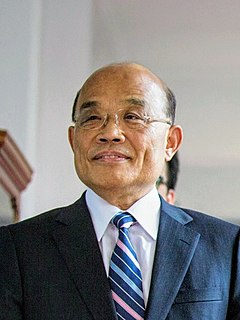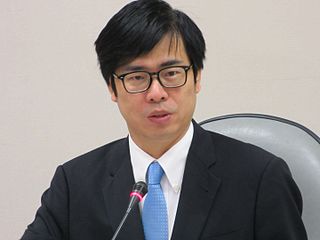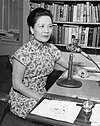
The Democratic Progressive Party (DPP) is a Taiwanese nationalist and liberal political party in Taiwan. Controlling both the Taiwan Presidency and the unicameral Legislative Yuan, it is the majority ruling party and the dominant party in the Pan-Green Coalition.
Premier is a title for the head of government in some countries, states and sub-national governments. A second in command to a premier is designated as a vice-premier or deputy premier.

The president of the Republic of China is the head of state of the Republic of China. Since 1996, the president is directly elected by plurality voting to a four-year term, with at most one re-election. The incumbent, Tsai Ing-wen, succeeded Ma Ying-jeou on 20 May 2016 as the first female president in the Country history. Originally established in Nanking in 1912, the government and its president relocated to Taipei in 1949 after losing the Chinese Civil War. Since the 1996 Taiwanese presidential election the president has been democratically elected.

The Premier of the State Council of the People's Republic of China, sometimes also referred to informally as the "Prime Minister", is the Leader of the State Council of China, who is the head of government and holds the highest rank in the Civil Service. This position replaced the role of Premier of the Government Administration Council of the Central People's Government, which existed from 1949 to 1954.

The flag of the Republic of China consists of a red field with a blue canton bearing a white disc with twelve triangles surrounding it. The disc and triangles symbolize the sun and rays of light emanating from it respectively.

In modern Chinese politics, the paramount leader of the Communist Party of China (CPC) and the Government of China is an informal term for the most prominent political leader in the People's Republic of China (PRC). The officeholders are usually General Secretary of the Communist Party of China and Chairman of the Central Military Commission. The paramount leader is not, however, a formal position nor an office unto itself. The term gained prominence during the era of Deng Xiaoping (1978–1989), when he was able to wield political power without necessarily holding any official or formally significant party or government positions at any given time.

The Premier of the Republic of China, officially the President of the Executive Yuan (行政院院長), is head of government of the Republic of China and leader of the Executive Yuan. The Premier is appointed by the President of the Republic of China without approval by the Legislative Yuan. The office is also alternatively known as Premier of Taiwan or Prime Minister of Taiwan.

There are eleven types of elections in Taiwan which, since 2012, have been unified into general and local elections, each held every four years, typically in January and November respectively. There may also be by-elections. Electoral systems include first-past-the-post, proportional representation, single non-transferable voting, and a parallel mixture of the above.
The central government of the People's Republic of China is the highest state authority in China under the exclusive political leadership of the Communist Party of China. It consists of legislative, executive and judicial organs.

The Vice President of the People's Republic of China, formerly translated as Vice Chairman of the People's Republic of China from 1954 to 1975, is a senior position in the government of the People's Republic of China.

The Chairman of the Standing Committee of the National People's Congress, officially styled the Chairman of the Standing Committee of the National People's Congress of the People's Republic of China, is the presiding officer of the Standing Committee of the National People's Congress of the People's Republic of China, which is considered China's top legislative body. The current Chairman is Li Zhanshu.

The Vice Premier of the Republic of China serves as the deputy to the premier and is appointed by the president, on the recommendation of the Premier. The title of vice premier had been changed several times, so this list is divided into several sections. This includes both vice premiers of the Republic of China before 1949, when the seat of government was in Mainland China, and vice premiers since 1949, when the seat of government was relocated to Taiwan.

The permanent members of the United Nations Security Council are the five sovereign states to whom the UN Charter of 1945 grants a permanent seat on the UN Security Council: the People's Republic of China, the French Republic, the Russian Federation, the United Kingdom of Great Britain and Northern Ireland, and the United States of America.

The president of the People's Republic of China is the head of state of the People's Republic of China. Under the country's constitution, the presidency is a largely ceremonial office with limited power. However, since 1993, as a matter of convention, the presidency has been held simultaneously by the general secretary of the Communist Party of China, the top leader in the one party system. The presidency is officially regarded as an institution of the state rather than an administrative post; theoretically, the president serves at the pleasure of the National People's Congress, the legislature, and is not legally vested to take executive action on its own prerogative. The current president is Xi Jinping, who took office in March 2013.

















